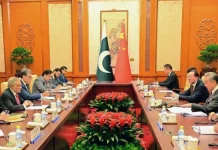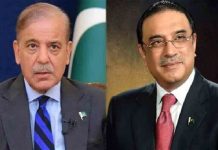By Makhdoom
Shehryar Babar
ISLAMABAD: The federal cabinet has constituted a special committee which will deliberate whether treason proceedings should be taken against the Pakistan Tehreek-e-Insaf (PTI) leadership under Article 6 of the Constitution.
According to details, Prime Minister Shehbaz Sharif chaired a federal cabinet meeting, wherein matters related to the country’s economic and political situation were discussed.
Addressing a press conference after the meeting, Information Minister Marriyum Aurangzeb said that a detailed discussion was held on the Supreme Court’s (SC) detailed judgment in the suo-moto case regarding former Deputy Speaker National Assembly Qasim Suri’s ruling.
The information minister announced that the special committee to be headed by Law Minister Azam Nazeer Tarar will have representation of all the coalition partners. Interior Minister Rana Sanaullah, Qamar Zaman Kaira and Tariq Bashir Cheema are also part of the committee.
“The committee will present its suggestions in the next meeting of the federal cabinet,” Marriyum Aurangzeb added.
A day earlier, Interior Minister Rana Sanaullah hailed the Supreme Court’s (SC) detailed judgment, saying that the government has started working on action under Article 6 of the Constitution.
Addressing a press conference in Islamabad, the Interior Minister said that the Supreme Court had proven once again that it would always uphold the Constitution and protect the people’s mandate.
The minister further said that the apex court has left it to the discretion of the government and Parliament to pursue the case under Article 6 — which pertains to treason.
Earlier, on Thursday, the Supreme Court (SC) had issued a 111-page detailed verdict in the National Assembly’s (NA) Deputy Speaker ruling case which was written by Chief Justice Umar Ata Bandial.
Justice Mazhar Alam Miankhel has also written an additional note on the 111-page detailed verdict on the suo motu case related to the then NA deputy speaker Qasim Khan Suri’s ruling on a no-trust move against then Prime Minister Imran Khan.
The detailed verdict stated that the deputy speaker exceeded his jurisdiction by rejecting the no-confidence motion. The deputy speaker wrote himself to urge a thorough investigation into the threatening diplomatic cable.
It read that how does the deputy speaker reject the resolution without any investigation and the constitution did not provide any protection to the moves of the deputy speaker.
After declaring the deputy speaker’s ruling unconstitutional, the National Assembly (NA) was reinstated. The previous government had not probed into the diplomatic cable nor apprised the details of the elements who were involved in the foreign conspiracy.




